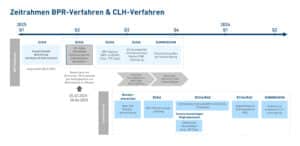The English text can be found here
Die CMR-Einstufung im Rahmen des BPR-Verfahrens könnte sich auf zahlreiche biozide und nicht-biozide Verwendungen von Ethanol auswirken. Die vorgeschlagene Einstufung in Karzinogenität und Reproduktionstoxizität Kategorie 1 (1A und 1B noch unentschieden) und mögliche Einstufung auf Mutagenität wäre mit einem faktischen Verbot des Wirkstoffes gleichzusetzen. Das Hervorheben der Auswirkungen einer CMR-Einstufung für Ihren Sektor, unter Aufzeigen des Mangels an Alternativen und der sozioökonomischen Auswirkungen ist somit von enormer Bedeutung.
Wie kann ich am Konsultationsverfahren teilnehmen?
- Führen Sie Ihre Kenntnisse über verfügbare Ersatzstoffe von Ethanol und die sozioökonomischen Auswirkungen der Nichtverfügbarkeit von Ethanol auf.
- Beteiligen Sie sich innerhalb der vorgesehenen Frist von 60 Tagen bis April 2025.
- Ihr Beitrag wird eine entscheidende Rolle spielen, wenn es darum geht, das Fehlen wirksamer Alternativen und die sozioökonomischen Auswirkungen eines möglichen Wegfalls von Ethanol aufzuzeigen.
- Die Bewertung von Ethanol und seiner weiteren Verwendung wird in hohem Maße von den Informationen abhängen, die im Rahmen dieser Konsultation gesammelt werden. Weitere offizielle Leitlinien finden Sie auf der Website der ECHA.
Was gibt es zu beachten?
- Achten Sie darauf, dass Ihr Beitrag optisch gut lesbar und übersichtlich ist.
- Legen Sie wissenschaftliche und sozioökonomische Daten vor, die dazu beitragen können, eine möglicherweise ungerechtfertigte Einstufung von Ethanol zu verhindern.
- Legen Sie bei der Einreichung Ihrer Daten auch klar dar, warum Sie Ethanol als Biozidprodukt in Ihrem Sektor benötigen.
- Die Stellungnahme kann in Landessprache oder auf Englisch abgegeben werden.
WICHTIG: Legen Sie nur objektive Daten vor, um Ihre Stellungnahme zu untermauern. Vermeiden Sie es, reine Behauptungen/Forderungen zu formulieren.
Welche Informationen sollten eingereicht werden?
- Vorstellung Ihrer Branche und Angabe, welche Art von Ethanol Sie verwenden und für welche Zwecke/Anwendungen.
- Daten dazu, warum Sie Ethanol verwenden, die Leistungskriterien, die Funktion und die Vorteile der Verwendung von Ethanol in Ihren Anwendungen.
- Informationen über Freisetzung, Exposition und den Umgang mit dem Produkt.
- Informationen über Alternativen (z. B. über deren Verfügbarkeit und Wirksamkeit).
- Falls verfügbar, wissenschaftliche und/oder sozioökonomische Daten (Studien oder selbst durchgeführte Tests).
- Normen und Spezifikationen, die Sie erfüllen müssen und die Bedeutung von Ethanol zur Erfüllung dieser Normen.
- Bedeutung der Stoffzulassung und Bedenken der Regulierungsbehörden.
Schritt-für-Schritt Anleitung
Hier finden Sie die Anleitung zum Ausfüllen der Stellungnahme: „Recommendations on public Consultation BPR v2“
Hier geht es zur Konsultation: Consultations on potential candidates for substitution and on derogations conditions – ECHA
Weitere Informationen zur Verfügbarkeit von Alternativen für Ethanol und einen Baukasten für Argumente finden Sie hier.
Einen Überblick zur unverzichtbaren Anwendung von Ethanol im Gesundheitswesen bietet unser Factsheet Etahnol
Lesen Sie in einen interessanten Artikel auf Chemical Watch über die möglichen Auswirkungen der Neueinstufung von Ethanol.

OUR PARTICIPATION IS IMPORTANT: Public Consultation on the Active Substance Ethanol
A carcinogenic, CMR classification in the BPR assessment could have an impact on numerous biocidal and non-biocidal uses of ethanol. The proposed classification as “carcinogenic and reprotoxic category 1” (1A and 1B still undecided) and a possible classification as mutagenic would be equivalent to a de facto ban of the active substance. For that reason, highlighting the impact of a CMR classification for your sector by emphasising the lack of alternatives and the socio-economic consequences is of enormous importance.
How can I participate in the consultation process?
- State your knowledge of available substitutes for ethanol and the socio-economic impacts of the unavailability of ethanol.
- Participate before the 60-day deadline ends in April 2025.
- Your submission will play a critical role in demonstrating the lack of viable alternatives and the socio-economic impacts of a possible ethanol phase-out.
- The assessment of ethanol and its continued use will depend largely on the information gathered through this public consultation. Further official guidance can be found on the ECHA website.
What do you need to consider?
- Make sure that your submitted opinion is easy to read and well-structured.
- Provide scientific and socio-economic data that could help to prevent a potentially unsubstantiated classification of ethanol.
- When submitting your data, also clearly explain why you need ethanol as a biocidal product in your sector.
- You can submit your opinion in your local language or in English.
IMPORTANT: Provide objective data to support your opinion and avoid simply making assertions or claims.
What information should be submitted?
- Your sector of industry, the type of ethanol you use and the applications you use it for.
- Data on why you use ethanol, the performance criteria, the function and the benefits of using ethanol in your applications.
- Information on release, exposure and product handling.
- Information on alternatives (e.g. their availability and effectiveness).
- If available, scientific and/or socio-economic data (studies or tests you have performed yourself).
- Standards and specifications you are required to comply with and the importance of ethanol in meeting these standards.
- The submitted opinion should recognise the importance of the substance approval and the concerns of the regulatory authorities.
Step-by-step instructions
Here are the instructions for writing opinions: “Recommendations on Public Consultation BPR v2”
Click here for information about consultations: Consultations on potential candidates for substitution and on derogations conditions – ECHA
Our Etahnol factsheet provides an overview of the indispensable use of ethanol in the healthcare sector factshet ethanol.
Read an interesting article on Chemical Watch about the possible effects of the reclassification of ethanol.